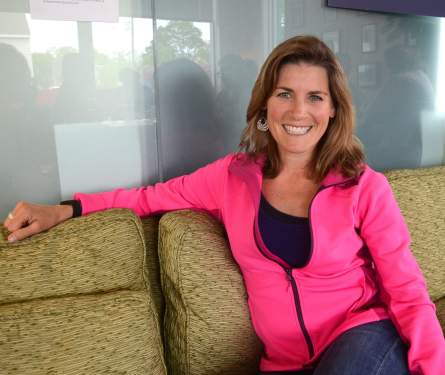Dr Georgianna Donadio, PhD
How much do YOU know about your own weight loss and weight gain patterns?
One of the frustrating aspects of health information that we hear the most from consumers is that just when you think you’ve got a handle on what you are supposed to do to be healthy – the information changes.
For example, not long ago those of us who were over 50 were assured that if we moderately cut back our portions, decreasing our calories and exercised for a half hour 4-5 times a week, we could keep at bay the extra body fat that creeps in after menopause.
How many of us dutifully reduced their calories and did their half hour routine daily only to feel that there was “something wrong with them” because this formula didn’t work for their body; but the “experts” said it was the right way to control weight after 50.
Wisdom, from research, has now shifted for women past the age when our estrogen is dramatically lower than pre-menopause. Estrogen, as every woman knows, is that amazing hormone that is a metabolic calorie burner as well as a reproductive hormone. It keeps us heart healthy; keeps our skin healthy and produces “pheromones” for attraction, among other body functions.
No longer is a half hour of exercise deemed adequate to increase the metabolic furnace that is slowed down by the loss of estrogen. We now have to exercise a minimum of one hour per day and really watch everything we put in our mouths, ESPECIALLY carbohydrates, which we want more than ever for the serotonin surge they give us. This new information comes from the fact that women over 50 generally do not lose the weight they want with just a half hour of exercise.
What IS important regarding losing weight and keeping it off after 50 is what our individual body tells us is right for our metabolism and body type. We need to ask ourselves what DO we know about ourselves and our own weight loss and weight gain pattern that should be more important than the “weight loss expert’s” advice.
The big question is, now that we are past the age of reproduction and our body no longer is protecting us against many of the maladies that come with getting older, what are we willing to make our priority and what do WE KNOW about our own metabolic profile and how food and exercise affects our body weight.
In addition, understanding the function of various hormones in regulating appetite and satiety, hormones such as ghrelin, leptin, cholecystokinin, and other peptides all relay peripheral signals to the hypothalamus, which control appetite and satiety. Passion and creativity increase this hormonal function to decrease appetite and increase satiety. Many of us experience this when we fall in love!
Important Questions to Ask Ourselves
1- What do I know about how I gain weight?
2- What do I know about how I lose weight?
3- Do I eat when I’m stressed?
4- Do I lose weight when I’m stressed?
5- Do I use food for emotional soothing?
6- Does eating play a dominant role in my daily routine?
7- Is losing weight more important than eating what I like when I like it?
8- What am I willing to give up to get the body weight I want?
9- Do I feel my food choices need to improve?
10- What is my personal experience with exercise?
11- What works best for me; what kind of exercise do I enjoy?
12- What do I know about how my body responds to exercise?
13- Am I willing to make the time to take care of myself?
14- What are my health priorities?
15- What are my ego priorities?
16- What keeps me from being the weight I want to be – REALLY?
The issue of weight loss is intimately connected with our relationship with our life force. Rarely do we see an energetic, productive, organized individual (men or women) who struggle with weight issues, even after 50 because they are often focused on their external interests and passions. Often these folks suffer from not taking the time to eat when or as much as they should.
One of the weight loss “secrets” I have learned over the years as a nutritionist from my patients is that when they are excited, creative, interested, and passionate about their work, their relationships, learning, doing or being, the issue of a naturally right body weight solves itself. We are often over-focused on the sensory experience and pleasure of food as a main stay for satisfaction and pleasure. Then, often when something else catches our attention, the issue of fulfillment comes from another source in our lives.
Something to consider – Find Your Passion!
References
Empty-Stomach Intelligence
Physiology, Obesity Neurohormonal Appetite And Satiety Control
Join the conversation. If you enjoyed this article, be sure to follow NIWH on Facebook and Twitter for regular updates filled with accredited health program information for holistic nurses and whole health coaches or advocates.
 It seems today we have a large menu of things to choose to worry about, from the economy to the latest flu epidemic heading our way. It is no wonder this is called the “age of anxiety” or that we are losing our grip on happiness and it is being replaced with anxiety. If you are female, the news is even more disconcerting. Science demonstrates that women are more prone to worry – that is at least more than men are.
It seems today we have a large menu of things to choose to worry about, from the economy to the latest flu epidemic heading our way. It is no wonder this is called the “age of anxiety” or that we are losing our grip on happiness and it is being replaced with anxiety. If you are female, the news is even more disconcerting. Science demonstrates that women are more prone to worry – that is at least more than men are.
 A standout amongst the most important aspects of tending to any medical problem is to comprehend the circumstances and end results of how and why you are encountering your side effects, and what they represent. Seasonal Allergies are, for some, the drawback to the magnificence of spring and summer. Itchy, runny eyes and nose, sniffling, coughing, and wheezing can direct a person’s actions, where they can go, and even what they can eat. A
A standout amongst the most important aspects of tending to any medical problem is to comprehend the circumstances and end results of how and why you are encountering your side effects, and what they represent. Seasonal Allergies are, for some, the drawback to the magnificence of spring and summer. Itchy, runny eyes and nose, sniffling, coughing, and wheezing can direct a person’s actions, where they can go, and even what they can eat. A 






